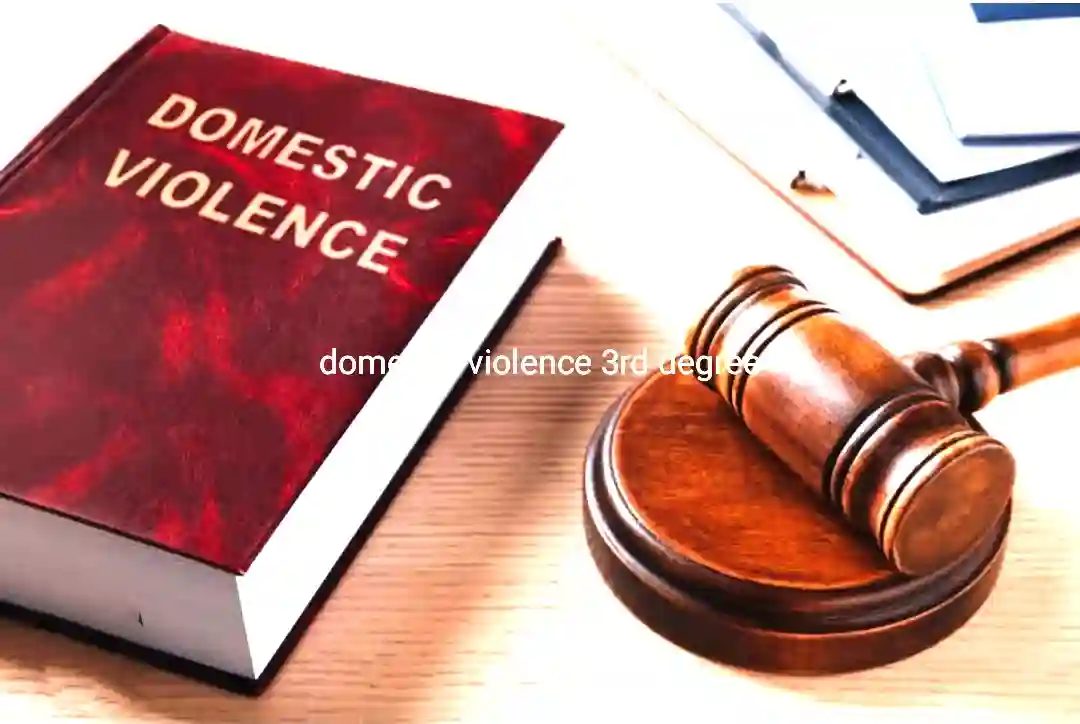
Domestic violence is a serious issue that affects individuals and families across the globe. It comes in many forms and can have significant emotional, physical, and psychological impacts. Domestic violence in the 3rd Degree is a specific type of domestic abuse that is often misunderstood. In this article, we’ll explore what domestic violence 3rd Degree means, the legal implications, how to identify it, and the resources available for survivors.
What Is Domestic Violence 3rd Degree?
Table of Contents
Domestic violence is categorized into different degrees depending on the severity and type of actions involved. Domestic violence in the 3rd Degree generally refers to non-felony forms of abuse, which often involve harassment, threats, and physical or emotional abuse that does not result in severe injury. Unlike 1st and 2nd-degree offences, domestic violence 3rd degree is usually classified as a misdemeanour but can still have serious legal consequences and lasting impacts.
In some jurisdictions, domestic violence 3rd degree may involve actions such as pushing, slapping, verbal abuse, or other forms of behaviour meant to intimidate or control a partner or family member. It is essential to understand that even though this type of domestic violence may not be categorized as the most severe, it is still illegal and highly damaging.
The Legal Definition of Domestic Violence 3rd Degree
The legal definition of domestic violence 3rd degree can vary from state to state. Still, it typically includes specific behaviours that fit the description of domestic abuse without resulting in significant injury or involving deadly weapons.
For example, in Alabama, domestic violence 3rd degree may involve harassment, menacing, reckless endangerment, or criminal coercion. The charge usually applies if the victim and offender are current or former spouses, co-parents, or dating. While the offence is considered a misdemeanour, it can lead to fines, imprisonment, and restraining orders.
A conviction for domestic violence 3rd degree could result in up to a year in jail, probation, and mandatory counselling. Additionally, it can have long-term impacts on employment, custody arrangements, and personal relationships.
Signs of Domestic Violence 3rd Degree
Recognizing domestic violence in its third-degree form can be challenging, as it does not always involve physical injury. Some of the critical signs to watch out for include:
- Verbal Abuse: Insults, belittling comments, or continuous criticism intended to hurt the victim’s self-esteem.
- Threats: Threatening to harm the victim, take away their children, or harm pets can be a form of domestic violence 3rd degree.
- Control Tactics: Using intimidation or coercion to control a partner’s actions or behaviour, such as tracking their location or monitoring their activities.
- Isolation: Preventing the victim from having contact with friends or family or making them feel guilty for maintaining outside relationships.
- Minor Physical Actions: Although not resulting in severe injury, actions like pushing, shoving, or slapping are considered third-degree domestic violence.
If you recognize these behaviours in your relationship or someone else’s, it is essential to seek help or support.
The Impact of Domestic Violence, 3rd Degree on Victims
Domestic violence of any kind can have significant and long-lasting impacts on victims. Third-degree domestic violence, while classified as less severe than other degrees, still has consequences that can negatively impact victims’ mental and emotional health.
Some common impacts include:
- Emotional Trauma: Constant verbal abuse, belittling, or threats can lead to anxiety, depression, and a diminished sense of self-worth.
- Physical Symptoms: Victims of minor physical abuse may experience bruises or other signs of trauma. Chronic stress can also lead to headaches, fatigue, and other health issues.
- Relationship Difficulties: Victims of domestic violence may struggle to form or maintain healthy relationships in the future due to trust issues and emotional scars.
- Children’s Well-Being: Children exposed to domestic violence in the household, even if they are not directly involved, may experience emotional distress, behaviour issues, and developmental delays.
How to Get Help If You Are a Victim
If you or someone you know is a victim of domestic violence 3rd Degree, there are several resources available to help. Taking the first step to reach out can be intimidating, but support is available.
- Hotlines: National domestic violence hotlines are available 24/7 for support and resources. The National Domestic Violence Hotline in the United States can be reached at 1-800-799-7233.
- Shelters: Domestic violence shelters offer safe places to stay for victims and their children, as well as access to counsellors and legal advocates.
- Legal Assistance: Victims can seek legal assistance for restraining orders, child custody, and other protections. There are often nonprofit organizations that provide free or low-cost legal support for victims of domestic abuse.
- Counselling: Seeking professional counselling can help victims process their experiences and heal emotionally. Many shelters and domestic violence organizations offer free or subsidized counselling services.
- Support Groups: Attending support groups can help victims connect with others who have experienced similar challenges, reducing feelings of isolation.
Legal Consequences for Perpetrators
The penalties for domestic violence 3rd Degree vary depending on the state or country, but expected consequences include:
- Fines: Perpetrators may face significant penalties if convicted.
- Jail Time: Depending on the jurisdiction and specific circumstances of the case, offenders may face up to a year in jail.
- Probation: Offenders are often sentenced to probation, which requires them to follow specific conditions, such as staying away from the victim, attending counselling, or performing community service.
- Restraining Orders: Victims can obtain restraining orders against perpetrators, which legally restrict their ability to contact or approach the victim.
The Role of Law Enforcement and the Legal System
Law enforcement plays a crucial role in addressing domestic violence 3rd-degree cases. Officers responding to domestic violence calls must evaluate the situation carefully and decide whether an arrest is necessary. In many states, law enforcement has the authority to arrest if they have probable cause that domestic violence has occurred.
Additionally, domestic violence charges can be pursued by the state even if the victim does not wish to press charges. This prevents perpetrators from pressuring victims to drop charges and ensures justice is served.
Preventing Domestic Violence
Preventing domestic violence involves both individual and community efforts. Here are some ways to contribute to the prevention of domestic violence in your community:
- Education: Raising awareness about what constitutes domestic violence and encouraging people to recognize unhealthy behaviours can help prevent abusive relationships from developing.
- Community Programs: Supporting or participating in community programs that provide education and resources to families can play a crucial role in prevention.
- Support Victims: If you suspect someone you know is experiencing domestic violence, offer support without judgment. Let them know you are there for them and encourage them to seek help.
- Encourage Healthy Relationships: Promoting healthy relationship behaviours and teaching conflict resolution skills can help prevent abusive behaviours from forming.
Domestic Violence 3rd Degree and the Stigma
One of the biggest challenges victims of domestic violence face is the stigma associated with seeking help. Many victims feel ashamed or afraid of judgment from others, which can prevent them from coming forward. Addressing this stigma is crucial in ensuring victims feel empowered to seek the help they need.
Society needs to understand that victims are never at fault for the abuse they experience, and support systems need to be non-judgmental and accessible. Providing education about the dynamics of domestic violence can also help reduce the stigma and encourage more people to take action.
Recovery and Healing
Recovering from domestic violence can be a long and challenging process, but with the proper support, it is possible. Healing is unique to each individual, and there is no set timeline for when someone should feel “better.” Taking the time needed to heal and seek supportive environments fostering growth and well-being is essential.
Some steps for recovery may include:
- Creating a Safety Plan: It is crucial to develop a plan to leave an abusive situation safely. This may involve gathering essential documents, finding a safe stay, and contacting supportive friends or family members.
- Professional Counseling: Counseling can help victims address the emotional and psychological impact of abuse and begin the process of healing.
- Building a Support Network: Surrounding oneself with supportive people can help with the recovery process. A solid support network is invaluable, whether friends, family, or support group members.
- Setting Boundaries: Setting healthy boundaries in all relationships moving forward is crucial for healing and avoiding future abusive relationships.
3rd degree domestic violence in sc (South Carolina)
In South Carolina (SC), third-degree domestic violence is the least severe form of domestic violence but still carries significant consequences. It generally involves causing physical harm or threatening to harm a household member. This type of offence is classified as a misdemeanour.
Critical Aspects of Third-Degree Domestic Violence in SC:
- Household Members: This includes a spouse, former spouse, individuals with a child in common, or people who are in or used to be in a romantic relationship.
- Actions Involved: Physical harm, attempts to cause damage or a threat that could make the victim reasonably fear imminent harm.
- Punishments: If convicted, penalties can include up to 90 days in jail, fines ranging from $1,000 to $2,500, and potential participation in counselling or a domestic violence intervention program.
These cases are usually heard in magistrate’s or municipal courts and may result in a criminal record, which can have long-term effects on employment and housing opportunities. Repeated offences may lead to more severe charges.
Suppose you or someone you know is involved in a domestic violence case. In that case, it’s highly recommended that you consult an attorney who specializes in such cases. They can help you navigate the legal proceedings and work towards the best possible outcome.
What is domestic violence 3rd degree Alabama?
In Alabama, “domestic violence in the third degree” refers to certain offences involving violence or threats against a household or family member, which are less severe compared to first or second-degree offences. Specifically, it typically includes:
- Assault in the third degree
- Menacing
- Reckless endangerment
- Criminal coercion
- Harassment or harassment communications
- Criminal surveillance
These actions qualify as domestic violence when they involve a current or former spouse, a partner, a family member, or someone with whom the accused has a dating relationship or child.
Domestic violence in the third degree is generally classified as a Class A misdemeanour, but multiple convictions can elevate it to a Class C felony. Penalties include fines, jail time (up to 1 year for misdemeanours), and mandatory counselling or intervention programs. The severity of the penalties can increase with the accused’s history or if aggravating factors are present.
What is domestic violence 3rd degree?
Domestic violence in the third degree is a legal term used to describe specific actions that fall under domestic violence but are considered less severe compared to first or second-degree offences. The exact definition and penalties vary by jurisdiction, but typically, domestic violence in the third degree refers to incidents that involve:
– Minor physical harm or the threat of harm to a family or household member.
– Intimidation, harassment, or verbal abuse that does not result in significant injury.
– Situations without the use of a deadly weapon or severe bodily harm.
In many cases, third-degree domestic violence is charged as a misdemeanour rather than a felony, meaning it may carry penalties like probation, mandatory counselling, or short-term jail time. However, repeated offences or aggravating factors could lead to harsher consequences.
It’s important to check specific state or local laws, as definitions and charges for domestic violence degrees vary widely across different jurisdictions.
What does 3rd degree domestic violence mean?
Third-degree domestic violence is typically the least severe category of domestic violence charges, but it can still have significant consequences. The specific definition and penalties vary by state, but in general:
Definition: Third-degree domestic violence refers to actions that involve physical harm, threats of harm, or other forms of abuse toward a partner, family member, or household member without severe bodily injury or weapon use. It often includes minor physical altercations, verbal threats, or harassment.
Common Examples: This may involve pushing, slapping, minor injuries, or threatening a person with violence without actually inflicting severe harm.
Consequences: Third-degree domestic violence is generally classified as a misdemeanour, leading to penalties such as fines, community service, anger management programs, or short jail sentences. Repeated offences can lead to more severe charges and stricter penalties.
The severity of the charge depends on state laws and the case’s specific circumstances. If you are dealing with a particular legal situation, it is recommended to consult a lawyer for accurate guidance and representation.
Conclusion
Domestic violence 3rd degree may be classified as a misdemeanour, but it can have severe and lasting effects on victims’ lives. Recognizing the signs, understanding the legal implications, and seeking appropriate help are all vital steps in combating domestic violence.
If you or someone you know is experiencing domestic violence, know that help is available. No one deserves to be treated with less than respect, and resources are in place to support victims in their safety and recovery steps. By increasing awareness, supporting victims, and challenging the stigma around domestic violence, we can work towards a society that no longer tolerates abuse in any form.
For anyone reading this, remember that domestic violence is never the victim’s fault, and support is out there. Whether through hotlines, shelters, or supportive friends and family, taking the first step towards safety is courageous and life-changing.
Resources for Domestic Violence Victims
- National Domestic Violence Hotline: 1-800-799-7233
- RAINN (Rape, Abuse & Incest National Network): 1-800-656-HOPE
- Local Shelters and Legal Aid Offices: These can provide immediate support and help victims escape dangerous situations safely.
Taking a stand against domestic violence is a collective effort. We must continue to educate ourselves, support those in need, and advocate for stronger protections and resources for victims of abuse. domestic violence 3rd degree, domestic violence 3rd degree alabama, 3rd degree domestic violence.
>> West virginia continuing legal education



